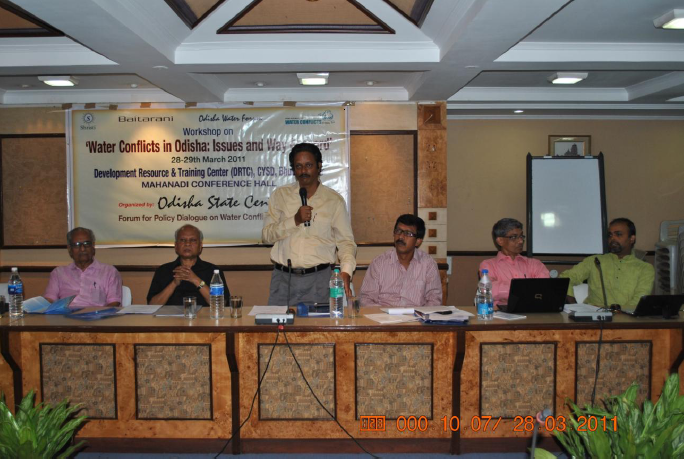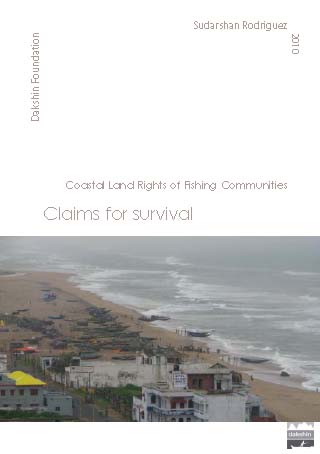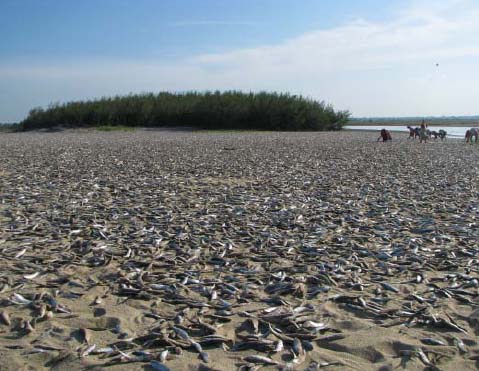/topics/conflicts
Conflicts
Proceedings of 'Water Conflicts in Odisha : Issues and way forward' - Organised by Odisha State Centre of the Forum for Policy Dialogue on Water Conflicts in India - 28th - 29th March 2011, Bhubaneswar
Posted on 27 May, 2011 12:48 PM
Development Resource & Training Centre (DRTC), CYSD, Bhubaneswar:
A 2-days Workshop on “Water conflicts in Odisha: Issues and way forward” has been organized during 28th – 29th, March, 2011 at Bhubaneswar by ‘Odisha State Centre’ of the ‘Forum for Policy Dialogue on Water Conflicts in India’. Environmental activists, thinkers, academicians, Government Officials, Farmer leader’s and Civil Society Organizations from different parts of the state participated in the workshop along with members of the National Steering Committee of Forum to discuss about the ongoing and emerging water conflicts in different geographies of the state.
Training workshop on understanding and resolving water conflicts in India, Forum for policy dialogue on Water Conflicts in India, 18th – 22nd July, 2011, Satapada, Chilika Lake, Odisha
Posted on 24 May, 2011 03:11 PM
Organizer: Forum for Policy Dialogue on Water Conflicts in India in collaboration with Baitarani Initiative and Odisha State Resource Centre of the Forum, SaciWATERs-CapNet Network (SCaN) and Cap-Net
Venue: Satapada on Chilika Lake, Odisha
Topics:
- Understanding water
- Normative concerns around water
- Legal and institutional issues related to water
Harbouring trouble - The social and environmental upshot of port growth in India – A report by Dakshin Foundation
Posted on 22 May, 2011 12:04 PMBesides its own impact, port development is often accompanied by other activities such as the location of industries, power plants, railway lines, highways, hotels, SEZs, residential complexes, etc., that have multiple detrimental impacts – environmental, social and erosion related.
Claims for survival - Coastal land rights of fishing communities – A report by Dakshin Foundation
Posted on 22 May, 2011 09:25 AM Marine-coastal ecosystems and coastal communities are poorly represented in the public debates on India’s social and environmental problems. Coastal and marine ecosystems are the backbone of a fisheries economy that supports livelihoods of millions directly and several more indirectly.
Marine-coastal ecosystems and coastal communities are poorly represented in the public debates on India’s social and environmental problems. Coastal and marine ecosystems are the backbone of a fisheries economy that supports livelihoods of millions directly and several more indirectly.
Community groups such as fishers and other coastal populations enjoyed customary or traditional rights to exploit resources and to fish in adjacent coastal areas. The current state of fisheries finds its genesis in the modernization programme introduced by the Government of India to ‘develop’ the sector with the focus for development through the maximisation of production. In the late 1970s, modern fishing methods threatened the livelihoods of these communities and coastal ecosystems. Mechanised craft and gear, principally trawlers with bottom trawling gear, severely impacted fishing stocks.
Fisherfolk in India have struggled for greater control over the seas and resource management, struggles which have been directed both inward as well as against the State. The conflict over the coastal space is mostly between fishing communities and other new users and interest groups. Access to coastal resources is now being thrown open to all, giving a new meaning to the idea of ‘coastal commons’. There are very clear linkages between the rights to the coast and the right to fish as without the former, the latter will be difficult to operationalise and eventually rendered meaningless.
The Coastal Regulation Zone (CRZ) Notification, 1991 has been the only legislation with some mention and reference to customary rights of fishing communities on land in the coastal zone. However, it did not contain provisions and details to ascertain or establish these rights. Despite this, fishing communities have seen the CRZ in its 1991 form as an instrument in their favour as it regulates all activities that can potentially impact the coast and community livelihoods. However, the twenty one odd amendments to the CRZ Notification were mostly in favour of development pressures and special interest lobbies.
some mention and reference to customary rights of fishing communities on land in the coastal zone. However, it did not contain provisions and details to ascertain or establish these rights. Despite this, fishing communities have seen the CRZ in its 1991 form as an instrument in their favour as it regulates all activities that can potentially impact the coast and community livelihoods. However, the twenty one odd amendments to the CRZ Notification were mostly in favour of development pressures and special interest lobbies.
This backdrop forms the driving force behind this report which seeks to argue a case for according coastal land rights to fishing communities.
The rape of Goa - A photo documentary by Rajan Parrikar (2008)
Posted on 17 May, 2011 05:41 PMGoa, the last remaining redoubt of the pleasant, civilized life in India, now faces environmental ruin from indiscriminate construction and exploitation of its natural resources. Concomitant with this ruin is the imminent erasure of its sui generis identity and culture wrought by the uncontrolled influx of migrants from all over India. First released in May 2008, this documentary was screened in towns and cities all across Goa.
Between the city and the salty sea - The wells of Bhuigaon, Thane, Greater Mumbai - Guest post by MS Gopal
Posted on 22 Apr, 2011 05:57 PMAs the concrete jungle of Greater Mumbai reaches Bhuigaon and overuse of groundwater sucks in the sea water, the traditional wells are under threat.
Inviting endorsements on a submission to the WGEEP for declaring the rivers in the Western Ghats as Ecologically Sensitive Areas (ESAs)
Posted on 22 Apr, 2011 12:58 PMDear friends,
We are all aware of the immense ecological, cultural and social significance of rivers originating and flowing through the Western Ghats. This includes source regions of East flowing rivers like Krishna, Godavari and Cauvery and the source, riparian and estuarine region of all West flowing rivers.
We are lucky to still have some of the very few and very rare 'free flowing rivers' in the country. Most of the rivers in our country have been dammed and diverted. This has changed the ecological and physical characteristics of these rivers completely. Today, it is difficult for us to visualise the amazing range of ecological goods and services that an undammed, free flowing river can provide. Some such rivers in the Western Ghats are Shastri, Aghanashini, Gargai and Seetha Nadi.
Transparent & participatory governance in functioning of the decision-making committees on water resources
Posted on 16 Apr, 2011 03:46 PMTo
Shri Salman Khurshid,
Union Minister of Water Resources,
Shramshakti Bhawan,
Rafi Marg,
New Delhi - 110001
2. Secretary, Union Ministry of Water Resources
3. Chairman, Central Water Commission
4. Deputy Chairman, Planning Commission
5. Member (Water), Planning Commission
6. Ms Aruna Roy, Chairperson, Working Group on Transparency, Accountability, Governance at National Advisory Council
Let Pinder river flow free - Thousands gather in people's public hearing and vow to oppose the dam
Posted on 15 Apr, 2011 05:16 PMI pray to all my friends, brothers and sisters to not join the company in turning this valley into a monstrosity!” These are the powerful words by Narmada Devi from Village Padmallah that marked the flavor of a peoples' public hearing on the Devsari HEP.
This public hearing on the 3 April 2011 saw strength of 2000 people from all proposed Devsari HEP affected and surrounding villages of the Pinder valley. The hearing was organized by Bhu Swami Sangharsh Samiti and Matu Jan Sangathan and took place at the Sangam Maidan of Block Deval, Tehsil Tharali, District Chomoli, Uttarakhand. Public hearing at Deval was a peoples' response to the project proponent hearing at Chepdu on 20 January 2011.
Maharashtra gifts farmers’ water to industries - Dams, Rivers and People - Newsletter from SANDRP of March 2011
Posted on 15 Apr, 2011 08:45 AM- Maharashtra gifts farmers’ water to industries
Between 2005 & 2010, a High Powered Committee was constituted by the Maharashtra Minister for Water Resources which recommended the diversion of 1500 MCM water from 38 dams across Maharashtra to cities and industries.





